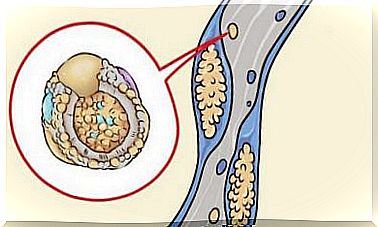8 Signs That You Suffer From Intestinal Disorders

Intestinal disorders often trigger digestive symptoms that can ruin your day and make you feel sick.
It is quite common to have stomach pain, inflammation and other stomach problems that can actually end up recurring, depending on what is causing them.
However, the health of your gut affects processes such as the secretion of certain hormones and your immune system. Thus, a diseased gut can also manifest itself in other parts of your body.
Symptoms of intestinal disorders
People often confuse their health problems with other diseases, in cases where the problem actually comes from their intestinal disorders. Therefore, today we would like to share 8 symptoms that may indicate that you are suffering from intestinal disorders.
1. Anxiety and depression

It can seem quite strange to connect your gut with your emotions. But as strange as it sounds, they actually have a lot to do with each other.
Approx. 70% of the serotonin in your body comes from this organ. Serotonin is the neurotransmitter responsible for happiness.
A reduced amount of this chemical makes you feel sad about fashion, while affecting the body’s physiological functions, such as your digestion.
2. High glucose level
Pre-diabetes and diabetes are chronic disorders that result from an excessive accumulation of sugar in your blood. In addition, it can be due to poor bowel function and bowel disorders. The bacteria that live in this part of your body can be affected and this leads to problems in metabolic processes that turn sugar into energy.
3. Skin problems can be a symptom of intestinal disorders

Conditions such as acne and eczema can be associated with problems in the intestines, especially in changes in the bacteria that live in them.
For example, the intestinal disorder triggers “leaky gut syndrome”, which is characterized by difficulty in digesting certain food particles, an inflammatory reaction that can often be seen on the skin.
4. Digestive problems
Inflammation of the stomach, flatulence and diarrhea are clear signs of changes in the bacterial flora that protect the intestines.
While these symptoms can arise from many different stomach problems, keep in mind that they can also come from an intestinal disorder.
Accumulation of toxins and poor digestion of certain foods can cause this.
5. Bad breath

Halitosis (what we know as bad breath) can come from a microbial imbalance in the intestines and in the intestinal system.
Although these bacterial imbalances start in the stomach, they can often move to other parts of your body, for example to the mouth.
If mouthwash and external remedies do not remove your bad breath, this may be the case.
6. Difficulty sleeping
Having trouble falling asleep warns of an imbalance in the chemicals that your brain secretes to sleep well.
One of these is serotonin, a neurotransmitter that also originates in the intestines.
When levels drop, or are generally not normal, insomnia and sleep disorders are very common.
7. Having a sweet tooth

Imbalances in bacteria caused by regular consumption of sugar and sweets can also be translated into a bottomless desire to continue eating this kind of food. As a result, the bacteria adapt to this substance that feeds them, and when levels drop, they take fuel away from your brain.
As a result, you have a greater appetite, and in the long run you will also gain weight.
8. Food intolerance can be a symptom of intestinal disorders
Food intolerance, such as lactose or gluten intolerance, is a by-product of a situation where the intestines have trouble digesting these substances completely.
When it comes to leaky gut syndrome, this condition where the gut cannot break down food properly triggers an inflammatory reaction that affects not only your digestion but also your immune system.
It is important to identify what the problem is as it can lead to more serious problems if left untreated.
In conclusion, we can conclude that although it is normal to have stomach problems sometimes, intestinal disorders can also affect your emotional well-being, as well as your skin and your metabolic health. Seeing a doctor right away is very important, especially if the symptoms do not go away or continue to occur.









